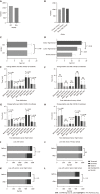Investigating adolescent mental health of Chinese students during the COVID-19 pandemic: Multicenter cross-sectional comparative investigation
- PMID: 36438680
- PMCID: PMC9693833
- DOI: 10.5498/wjp.v12.i11.1323
Investigating adolescent mental health of Chinese students during the COVID-19 pandemic: Multicenter cross-sectional comparative investigation
Abstract
Background: The coronavirus disease 2019 (COVID-19) pandemic has caused significant challenges for adolescent mental health.
Aim: To survey adolescent students in China to determine the effects of the COVID-19 pandemic on their mental health.
Methods: A multicenter cross-sectional comparative investigation was conducted in March 2022. We collected demographic information and survey data related to the COVID-19 pandemic. The Patient Health Questionnaire-9 and Generalized Anxiety Disorder Screener scales were used for objective assessment of depression and anxiety.
Results: We collected mental health questionnaires from 3184 students. The investigation demonstrated that adolescents most strongly agreed with the following items: Increased time spent with parents, interference with academic performance, and less travel. Conversely, adolescents most strongly disagreed with the following items: Not having to go to school, feeling an increase in homework, and not socializing with people; 34.6% of adolescents were depressed before COVID-19, of which 1.9% were severely depressed. After COVID-19, 26.3% of adolescents were prone to depression, of which 1.4% were severely depressed. 24.4% of adolescents had anxiety before COVID-19, with severe anxiety accounting for 1.6%. After COVID-19, 23.5% of adolescents were prone to anxiety, of which 1.7% had severe anxiety.
Conclusion: Chinese adolescents in different grades exhibited different psychological characteristics, and their levels of anxiety and depression were improved after the COVID-19 pandemic. Changes in educational management practices since the COVID-19 pandemic may be worth learning from and optimizing in long-term educational planning.
Keywords: Adolescents; COVID-19; Chinese students; Grade analysis; Mental health.
©The Author(s) 2022. Published by Baishideng Publishing Group Inc. All rights reserved.
Conflict of interest statement
Conflict-of-interest statement: All the authors report no relevant conflicts of interest for this article.
Figures

References
-
- Kwong ASF, Pearson RM, Adams MJ, Northstone K, Tilling K, Smith D, Fawns-Ritchie C, Bould H, Warne N, Zammit S, Gunnell DJ, Moran PA, Micali N, Reichenberg A, Hickman M, Rai D, Haworth S, Campbell A, Altschul D, Flaig R, McIntosh AM, Lawlor DA, Porteous D, Timpson NJ. Mental health before and during the COVID-19 pandemic in two longitudinal UK population cohorts. Br J Psychiatry. 2021;218:334–343. - PMC - PubMed
LinkOut - more resources
Full Text Sources

